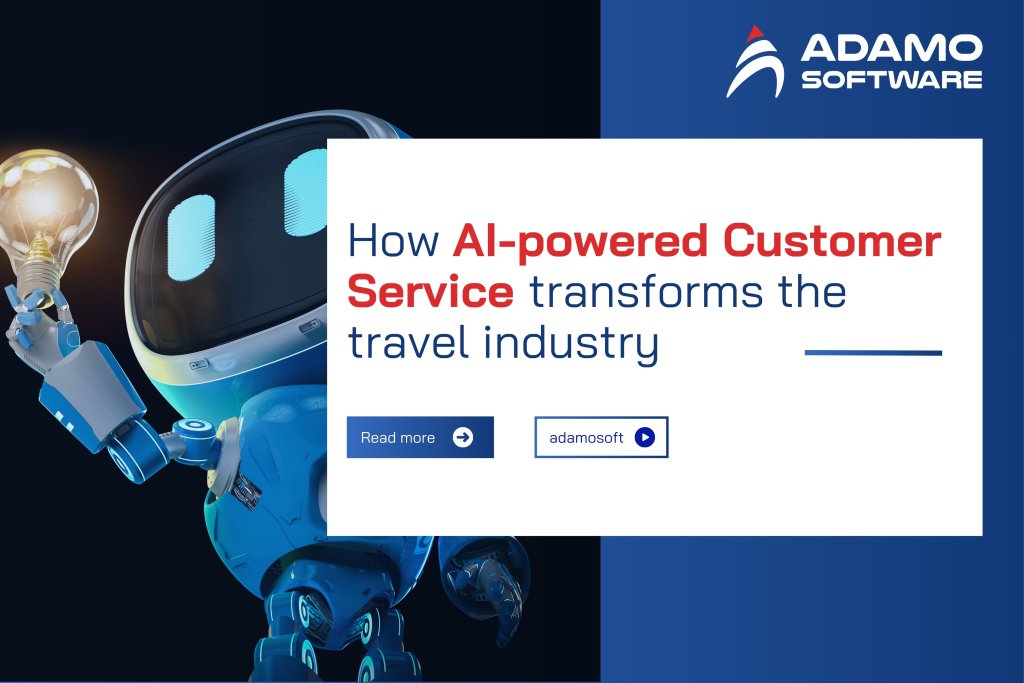Car Sharing App Development: A game-changer for travel businesses
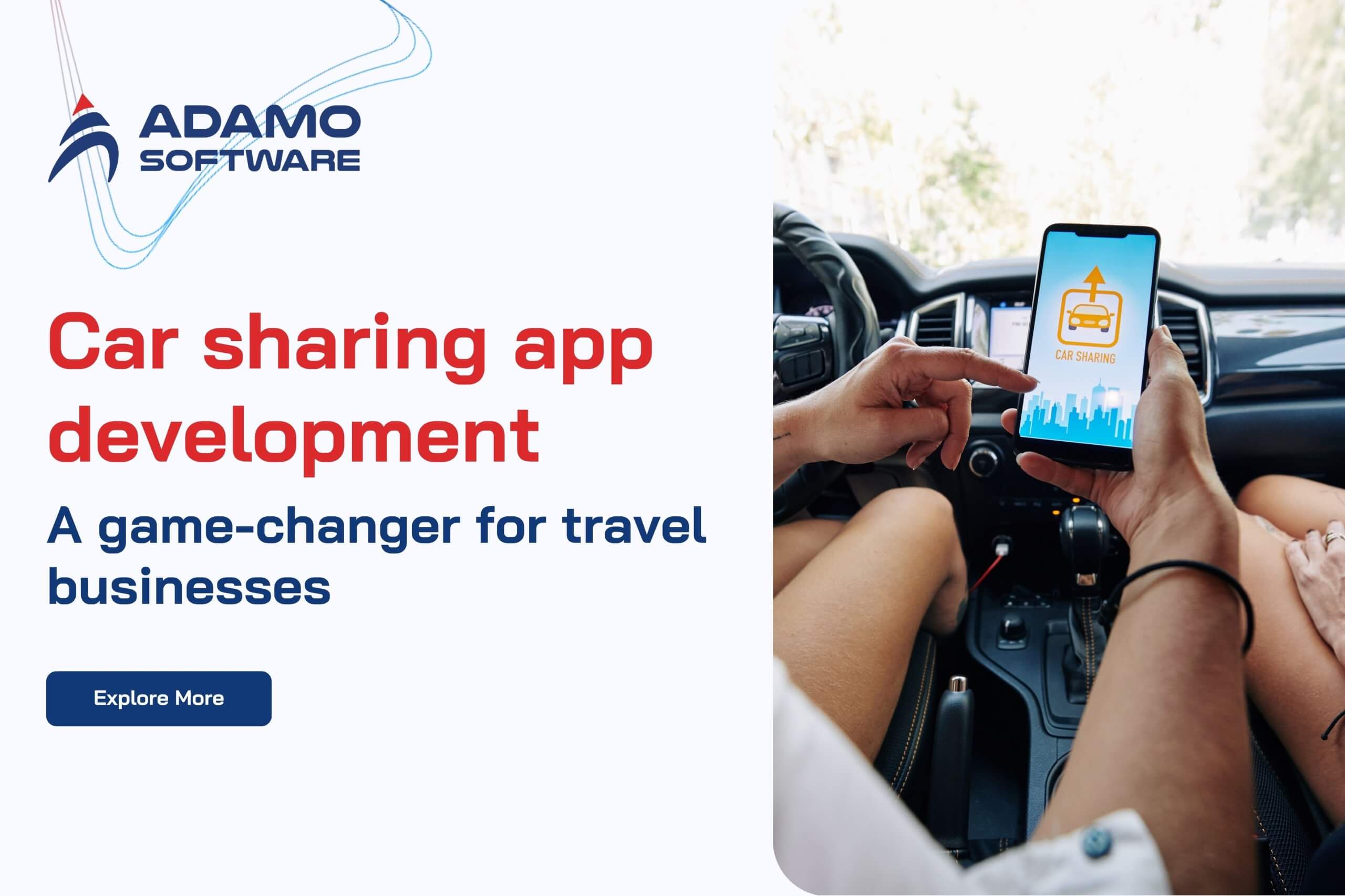
Car sharing app development allows managing a car-sharing system depending on users’ demands. The apps serve as a virtual parking lot where users can hire vehicles.
Because people are always busy, innovations are being developed to provide efficient and environmentally sustainable transport services. Some of the most important novelties within this context are related to car sharing app development. Such applications allow citizens to share automobiles, eliminating expenses and emissions while allowing them access to various mobility choices.
This article focuses on what it means to car sharing app development, the increasing market applicability, and the kinds of applications available. We will also discuss the benefits of such services for today’s travel. There will be a comparison between them and regular taxi services. The article also gives tips for those who decided to cooperate with an experienced developer like Adamo, on how to have a successful cooperation. If you are interested in gaining insight into how to change how your travel business works for the better, this guide will be useful.
I. What is Car Sharing App Development?
Car sharing app development means creating a mobile or web application that allows managing a car-sharing system depending on users’ demands. These apps serve as a virtual parking lot where users can hire vehicles for a short time. To give back, they do not have to own them. With most people seeking convenient and cheap transport, car sharing apps are of significance. They link those with vehicles with those who need a specific ride.
The software application of car sharing services is for efficient use of automobiles. It helps to avoid the use of cars by providing a platform where the car is only used at a certain time effectively. This reduces traffic and promotes environmental conservation. They usually come equipped with complementary functions such as a live map of car availability. They are an integrated possibility to book and pay for the car, GPS navigation, and others, including user identification to guarantee safety for both sides, car owner and renter.
From owners renting their cars directly to other users to professionally run fleets, car-sharing app development targets the market. Given the increasing need for environmentally friendly and versatile transport, having reliable and easily usable car-sharing applications has never been more relevant.
To sum up, car sharing app development is altering how people access transport technology by giving a solution to the traditional car rental management software. This application provides easy access to cars on a hire basis. Therefore, it helps businesses and users to adopt eco-friendly transport means. For better known
II. The market of on-demand car-sharing app development
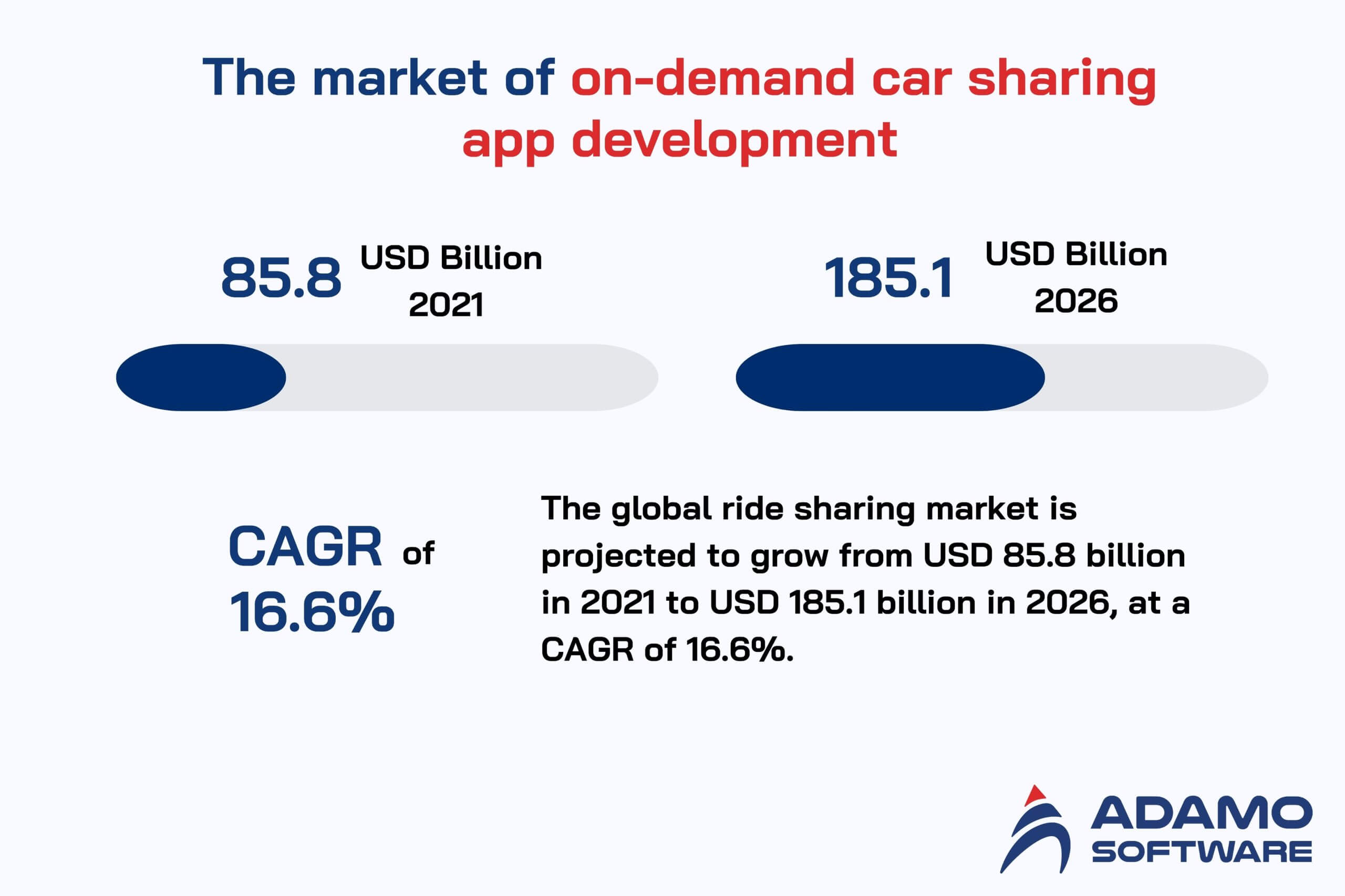
An analysis of the car sharing app development market reveals it has accelerated in development over the last decade. The reason is the growing need for cheap, ecological, and versatile transportation. As the urbanization process takes place the consumer chooses an easy way to perform a particular task concerning environmental impacts. Car-sharing services have become one of the favorite options for individuals and companies.
In more recent reports, the car-sharing global market is expected to reach more than $ 11B by 2030 with a CAGR of around 24%. This commendable rise is attributed to the promotional use of technology, rising Smartphone users, and a change of trends from ownership to use of cars for hire. Car sharing app development likely markets are North America, Europe, and the Asia-Pacific region particularly the developing regions of the world.
This market has been enlightened by the need to adopt sustainable solutions in society. Currently, governments and environmental organizations are promoting shared transport means to fight CO2 emissions and traffic jams. As a result, the prospect of attracting environmentally aware consumers has led firms to commit resources towards the creation of car sharing app development systems.
In addition, growth in the gig economy has also contributed to the market over the years. Some of the car-sharing platforms are extending their business to other companies like food delivery, ridesharing, etc., Due to this, the world is demanding more advancement in car-sharing apps.
Competition influences the existing market. Well-known competitors such as Zipcar and Turo have high expectations. However, new industry entrants and market newcomers have creative propositions. Elements such as adequate EV support, tiers, and elaborate user analysis have become part of the standard for car sharing app development.
All things considered, there is much demand for car sharing app development due to a set of technological advancements, flourishing environmental consciousness, and altering consumer insights. This trend creates a perfect chance for entrepreneurial activity. It develops mobile applications that can address the continuously increasing need for more efficient and environmentally friendly car-sharing services.
III. Types of car ride-sharing apps
Although car sharing app development, it is necessary to learn different types of car ride-sharing apps. There are various models to meet various types of users and their requirements, different business objectives, and organizational strategies. Below, we explore the primary types of car ride-sharing apps that dominate the market:
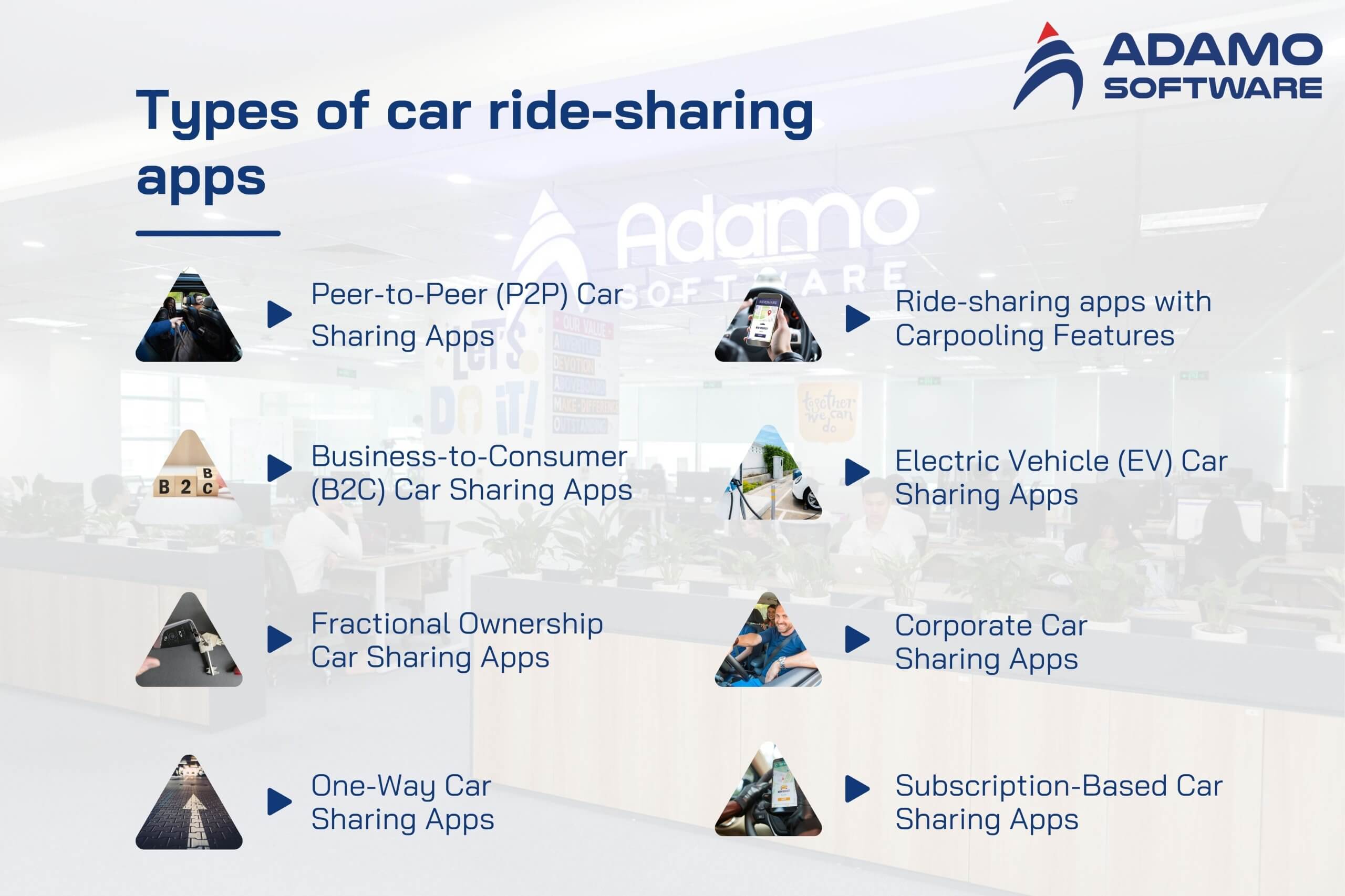
1. Peer-to-Peer (P2P) Car Sharing Apps
This involves private users who make their vehicle available for use to other users through an application. In this model, Turo has embraced the market by providing a way through which car owners can generate income by lending out their vehicles. Mobile app development for car rental in the P2P model means that the app must contain options such as user identification, and a dependable payment system. It needs to have feedback to maintain the confidence between renters and car owners.
2. Business-to-Consumer (B2C) Car Sharing Apps
B2C applications are run by companies that have a fleet of vehicles. These vehicles are rented for short times as by hour or day. It is named free-floating car sharing and some examples of such systems are Zipcar and Car2Go. Writing about B2C solutions, car sharing app development might contain real-time tracking, car availability, and membership services.
3. Fractional Ownership Car Sharing Apps
These apps let several individuals share one car, and in some way means that multiple people own it. Thus, instead of a traditional buying model with total ownership, costs related to purchasing, insuring, and maintaining the asset are divided among users. The car sharing app development in this segment focuses on calendar and odometer features. It shares options that allow co-owners to manage their shared automobile effectively.
4. One-Way Car Sharing Apps
These apps enable clients to hire a certain car at one point and leave it at another. This model is suitable for short journeys such as in cities. It is gradually recording market acceptance in these regions. Mileage for car-sharing apps that focus on one-way car sharing include; a navigation system, parking space identification, and flexible pickup/drop-off zone.
5. Ride-sharing apps with Carpooling Features
Although they do not specialize in car rental, it is noteworthy that many of the already mentioned mobile applications, such as BlaBlaCar, offer carpooling. All these apps help people using the same means of transport plan and share costs. Some of the functionalities regarding car sharing app development include route matching, fare calculation, and communication solutions.
6. Electric Vehicle (EV) Car Sharing Apps
Since the need for a sustainable approach to traveling is constantly increasing, EV car sharing is becoming relevant. Such apps are related to electric cars and include features as battery levels, charging stations, and environmental bonuses. All these functionalities are considered essential in current car-sharing app development.
7. Corporate Car Sharing Apps
Intended for commercial use, applications for business or corporate car sharing provide company management over car fleets for employee usage. Some extensions are administrative features, usage reporting tools, and options for scheduling. The car sharing app development for corporate solutions needs to be based on scalability requirements and data protection.
8. Subscription-Based Car Sharing Apps
Two main structures of car-sharing access are available: users may access only one car at a time for a specific period and have access to a fleet of cars. Most of them seem to be personalized and employ the rental business model. This means they don’t have to be owned to be used. A successful car-sharing app must have a good subscription management system, and the pricing model must have different levels.
Every car ride-sharing app type is useful in its way. The option of the model depends on target consumers and organizational goals. Altogether, car-sharing app development is creating a suitable platform for P2P, EV solutions, and corporate fleets that enhance the quality of new sustainable mobility arrangements. However, there are several fundamental areas that businesses must focus on for their application to be competitive. These fundamental areas include the following – In terms of the features provided, the application must be superior or unique to provide to its clients. The application must be designed to fulfill the exact need of a user or to satisfy their expectations.
IV. The advantages of Car Sharing App Development in modern travel
With the car sharing app development, people have changed their approaches to traveling for the better providing eco-friendly and cheap opportunities. The innovations provided in these applications improve travel. They also satisfy the increasing concerns for green solutions in the contemporary world. Below, you can find the most significant benefits that will make car sharing app development a major shift for the travel industry.
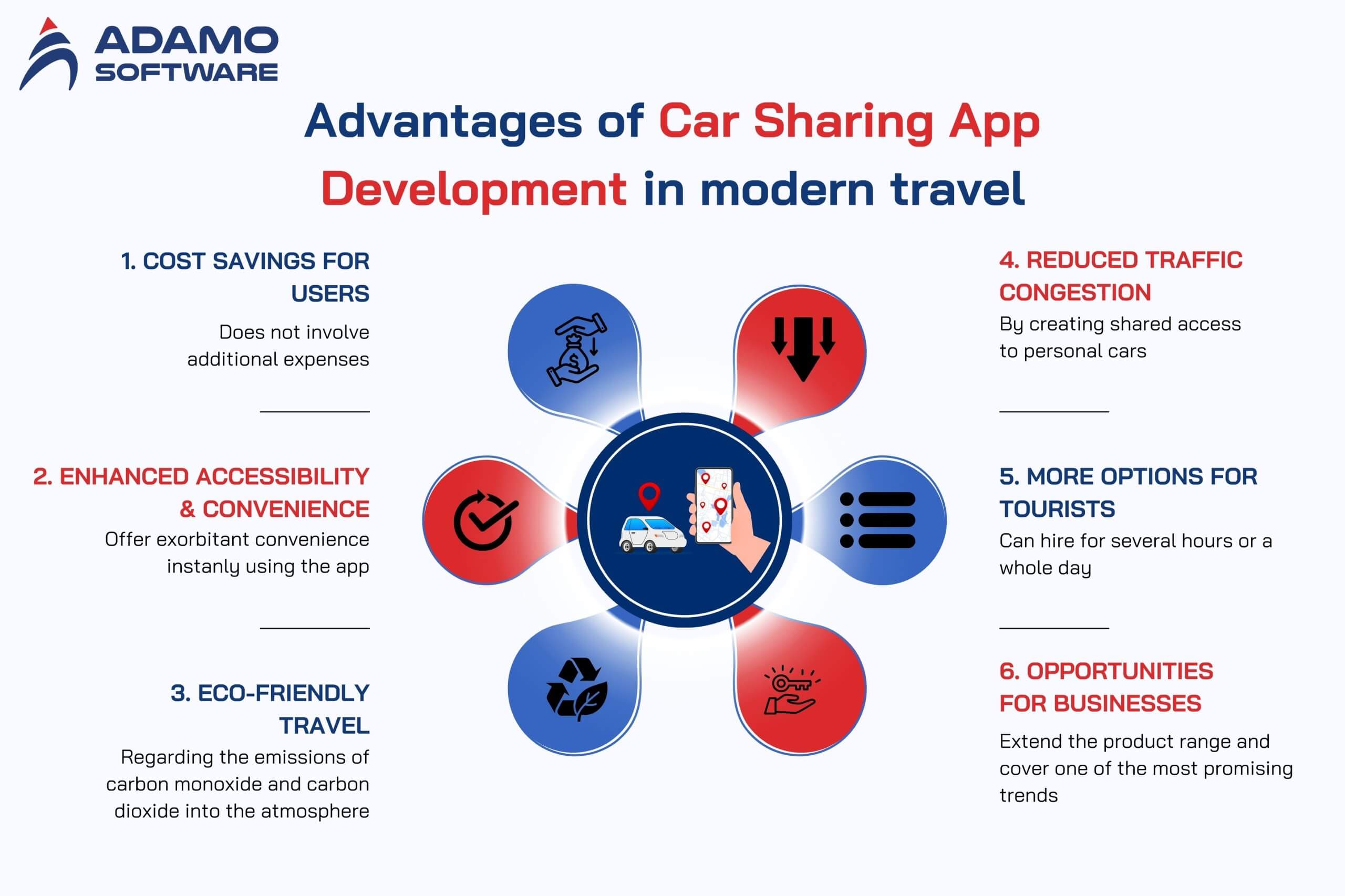
1. Cost Savings for Users
A popular app-sharing service is a low-cost mobility service. Car sharing does not involve expenses such as maintenance fees, insurance, and fuel costs that users of personal cars will incur. Owing to car-sharing app development, customers can get actual price models on the internet. This makes them select vehicles that are pocket friendly.
2. Enhanced Accessibility and Convenience
The car-sharing car rental applications offer exorbitant convenience considering the user gets to book a car instantly using the app. Such features as live car availability and GPS allow the users to find and book the closest car, coming right to them. Another feature that makes most current car sharing app development. User Friendly allows anyone using the app for the first time will find it easy to guide themselves around the particular application.
3. Eco-Friendly Travel
Regarding the emissions of carbon monoxide and carbon dioxide into the atmosphere, car sharing is highly advantageous. It minimizes the number of people’s automobiles. Civic car sharing is part of the car-sharing services that involve electric and hybrid cars in their fleets. Hence it reduces the effects further. Car sharing app development as a concept is perfect for helping businesses become more environmentally conscious and propels society toward being as clean as possible.
4. Reduced Traffic Congestion
Consequently, car sharing has been of great aid in freeing congestion in congested urban centers by creating shared access to personal cars. By giving our car-sharing app proper notice and with more using pooling alternatives and optimizing the route in real-time. A conscious effort is made to minimize the number of cars on the roads.
5. More Options for Tourists
While dealing with car rental services people are used to filling out several forms and schedules but not with car-sharing applications. Customers can hire the car for several hours, or a whole day. This process makes it easier with car sharing app development that can give variable rental periods so that users can plan their travel as they wish.
6. Opportunities for Businesses
The car sharing app development is a way for businesses to extend their product range and cover one of the most promising trends in transportation. Implementations may include artificial intelligence, recommendation systems, customized interfaces, and analytics to better engage users’ profitability.
The advantages of car sharing app development are clear: navigation becomes easier, the environment is protected, and new jobs are provided for users and companies. Today, car-sharing apps for mobile devices are revolutionizing the world of travel. They suggest people have more effective and less risky possibilities.
V. Car sharing vs Taxi Services: What is better for traveling?
When selecting the type of transport, people ponder over car sharing or engaging in a taxi service. Each has its pros and cons, although car sharing has experienced a new dawn recently due to the increasing adoption of car sharing app development. Thus, it titles the odds in favor of shared mobility solutions. Now, let’s look at the relative advantages of car-sharing services.
1. Cost-Effectiveness
Another big selling point in the fight between car sharing and taxi services is the cost factor. Tax experiences, for example, have prices whereby users are charged based on distances and time, which can be expensive for long distances. However, car-sharing apps are differentiated because users can hire a car at a fixed hourly or daily charge. This will be cheaper in the long term than positive. Due to further development in car-sharing apps, car users can fully appropriate rational price mechanisms. It is real-time, efficient, and low-cost price estimations.
2. Convenience and Flexibility
Convenience is evident from taxi services. Clients do not have to look for any specific public means. Their services are restricted by availability, and they may take some time to get to clients. Unlike ride-sharing apps that offer transport services in real-time more flexibility is offered by car-sharing apps. Users can pick up and drop off their cars independently. Features such as GPS on car sharing app development allow users to find the nearest car quickly. They can plot the route they wish, and use the car on their timer, not the driver’s.
3. Control and Independence
Car sharing entirely puts the destination of the travel in the hands of the user. The biggest advantage of car sharing is that car sharing provides the user with an opportunity to operate the car on your own and provide privacy. Such independence is especially attractive for travelers who do not like to communicate with other individuals, sharing confined spaces on different vehicles. As more refinements are made to car sharing app development and usage, features such as planning the best route and a navigation system within the app also add to this feeling of control.
4. Sustainability
Articles show that car sharing is better and less hazardous to the environment than taxi services. Most car-sharing applications encourage the utilization of electric or hybrid cars which leads to lowered emissions of carbon. Moreover, app development in car sharing has also made intelligent usage and pooling solutions possible. Thus, the level of traffic jams and the overall number of cars have been successfully reduced. Taxi services, however, comprise one passenger who drives the car empty to pick up the next passenger. Therefore, it consumes more fuel and emits more into the environment.
5. Use Cases and Suitability
- Short Trips and Emergencies: Taxi services come in handy in short distances or in instances where a user requires transport urgently.
- Planned Travel and Long Durations: Car sharing works best when used for planned trips, longer trips, or trips when a car is required for more than a few hours, or for a day.
6. Technology Integration
Cab service typically uses conventional booking systems or basic on-demand applications, at the moment. Car sharing app development has moved from traditional apps. It provided enhanced features like Artificial intelligence-based car suggestions, availability in real-time, and an integrated payment gateway. These features make car-sharing applications flexible and easy to use.
Even though taxis are still beneficial for short and immediate transportation needs. Car-sharing service offers more satisfactory solutions to cost concerns, a moderate attitude toward the environment, and self-reliant travelers. Such innovations are making this change by continuously improving car-sharing apps. This provides users with more convenient and environmentally sustainable transport. Car sharing cooperatives are usually more modern, efficient, cost-effective, and environmentally sustainable forms of transport than taxis.
VI. Contact with Adamo’s experts for a successful Car Sharing App Development

To avoid getting lost among the sea of apps already available on the market, developing a car-sharing application needs a lot of effort. It requires knowledge of the target audience’s wants and requirements. Being a team of skilled developers, Adamo Software delivers innovative solutions with a distinct focus on your business goals. As it stands, our team at Adamo is capable of designing and car sharing app development from scratch. All we need is a client’s idea or requirement and we set to work. Other than the development process, we are also knowledgeable in app deployment and continuing support even after release into the market.
Whether you are creating a partial export/share, a car-sharing service based on a fleet of vehicles, or just a P2P platform, Adamo’s specialists guarantee smooth operation. We complete adaptability of the site’s interface, and its additional features such as GPS tracking and integrated payments. Choose Adamo now for your car sharing app development project and turn that idea into a reality on how people move today.
FAQs
1. What is car sharing app development, and why is it important?
Car sharing app development is designing mobile or web applications whereby people can rent and share cars for a limited period, including hours and days. This technology is relevant. It offers people a greener and far cheaper option to independently own and use a car. Facilities such as real-time tracking, simple bookings, integrated payments, and sharing apps meet the increasing need for cleaner and more versatile mobility solutions that revolutionize urban mobility.
2. What are the essential features of a car-sharing app?
A car-sharing app must include features like:
- User Registration and Profiles: As for safe and individualized access.
- Real-Time Car Availability: To show nearby vehicles.
- Booking and Payment Integration: Ideally for the renting process.
- GPS and Navigation: To identify automobiles and direct clients to the places of their interest.
- User Reviews and Ratings: For the institution to establish trust in the community.
Contemporary car sharing applications also involve AI-driven recommendations, Big Data and disappointment, and EV support to improve its usability and environmentally friendly approach.
3. How does car sharing differ from traditional car rentals?
Car sharing involves access to a car flexible as per the hour or day basis while car rental involves secular booking on a longer basis than a day. The applications powered by car sharing make the process easier through booking and key retrieval through an Application Programming Interface, Quick access to cars On-demand, and mobile application-based fleet management. The advance of car sharing application development has made it easier for such services to be provided through an application. Thus, it minimizes paperwork and face-to-face meetings.
4. What are the costs associated with developing a car-sharing app?
The cost of car-sharing app development varies based on several factors:
- Features and Complexity: Artificial Intelligence integration or EV compatibility add to the product’s price.
- Platform Choice: Depending on the platform where you develop – iOS, Android, or both – the cost is going to vary.
- Design and Customization: Customized user interfaces and branding, on the other hand, contribute to the development cost.
It may cost around $30,000 – $150,000 or even more to build a car-sharing app if you include lots of features and a team of professional developers. Working with experienced development firms promises the development of the best product that fully meets business requirements.
5. How can businesses ensure the success of their car-sharing app?
The nature of the competition is quite high, and a car-sharing app has to be as innovative as possible, as friendly to the users as possible. It has to be backed up with intense operational support. Businesses should:
- Carry out a market study to find out the kind of users the product will meet.
- Some of the additional features that must be implemented include features. They can be tracked in real-time and features based on artificial intelligence.
- Acknowledge sustainable transportation and the ever-increasing demand for electric vehicles by incorporating EV choices and green work.
- Ensure that the customer support is great and fixes the problems that users have with the application regularly.
- To this end, working with travel and hospitality software developers and using new technologies. This means when the app is developed and released it will meet the expectations of the users and businesses.
Answering these questions will help businesses and users recognize the truly tremendous opportunities for car sharing development in today’s travel world.




